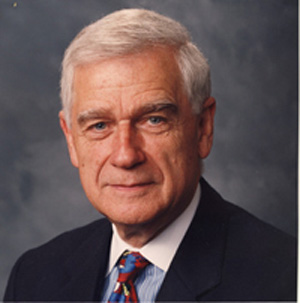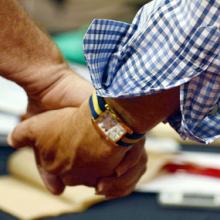reformed church in america
There is a tragedy happening within U.S. denominations and religious institutions that cripples the witness of the church in the wider society. Bonds of Christian fellowship are being torn asunder by the debate over the inclusion of LGBTQ people in the church, creating untold pain and suffering for many LGBTQ people and others, while sharpening disunity in Christ. And all this is unnecessary, and unfaithful.
Differences in the body of Christ over ethical and theological issues have been with the church since its inception. The letters of the New Testament and ministry of its first leaders were focused on how we live together in the face of inevitable tensions. Our call is to display an outpouring of humility, a commitment to the well-being of other brothers and sisters, and a self-giving love that builds a community truly shaped by the Spirit and acting as a corporate body infused with the love of Jesus.
In the same-sex marriage discussion, people cite 2,000 years of church history to support their suspicions of affirming theology. But this same history offers plenty of examples of healthy theological shifts that actually counter tradition. Healing on the Sabbath went against thousands of years of history. Replacing circumcision with baptism went against thousands of years of history. Even the Reformation went against 1,500 years of history, with the Reformers’ claim that they better understood the church fathers than the church did. History reveals that the church is always learning, always engaging in a re-examination of core values.
The quaint Pillar Church sits directly across the street from Hope College in Holland, Mich. — the first congregation established by a wave of Dutch immigrants to the area. When I enrolled at Hope in 1963, all I knew was that virtually no students went to Pillar Church.
A half century later, the story of Pillar Church tells a much larger narrative of the long and arduous journey toward authentic Christian unity.
Pillar Church and Hope College were both founded as part of the Reformed Church in America, a denomination formed by Dutch settlers to New Amsterdam (we now call it New York City) in 1628. A later wave of Dutch immigrants settled in the Midwest, particularly western Michigan. Some of them broke away and established the Christian Reformed Church in North America in 1857.
From its founding, Pillar Church had been a member of the RCA. But in 1882, a group siding with the emerging CRC seized the church building, locked its doors with chains, and, grasping axe handles, defended it against their fellow congregants. From then on, Pillar Church was a CRC congregation, and it became essentially foreign territory to those of us at the RCA-affiliated school across the street.
One would think that sharply defined theological differences among Reformed Protestants — who are famous for their theological exactitude — would have been the cause of such a dramatic intra-ethnic split. But no.
When I was ordained as a "Minister of Word and Sacrament" in the Reformed Church in America, a denomination that began in 1628, I imagined that I was being ordained to a church that was "reformed and always reforming!" (Emphasis mine).
Reformata et semper reformanda was a theme of the Reformation, which Martin Luther kicked off on Oct. 31, 1517 when he nailed his Ninety-Five Theses to front door of Castle Church of Wittenberg, Germany.
But rather than reviewing history from a half-millennia ago, let me explain what I hoped for 22 years ago, when I was ordained.
Albania was perhaps the most closed society in the world during the Cold War, with absolutely ruthless persecution of all religion. Churches were destroyed in every corner of that country. Clergy were eliminated. Worship was outlawed. And enforcement was brutal.
When Communism fell, and the country opened for the first time in decades, the Albanian church began a miraculous process of rebirth. We heard the moving story of the Albania Orthodox Church, rebuilding countless church structures, but even more importantly, restoring faith in the hearts of its people. I've known its leader, Archbishop Anastasios, from past encounters at the World Council of Churches, and he surely is a saint. The revival of religious faith in Albania and its compassionate service to those in need is a magnificent story of the church's witness, and the Spirit's power.
The atlas also documents other dramatic trends, including the fragmentation of Christianity. New denominations, often borne out of strife and division, multiply endlessly. In Korea, for instance, there are now 69 different Presbyterian denominations. At the rate we are going, by 2025 there will be 55,000 separate denominations in the world!
That is an utter mess fueled by rivalry and confusion that hampers the church's witness and makes a mockery of God's call to live as parts of one body.
The atlas also documents the dramatic rise of revival movements throughout the world, and charts the story of Pentecostalism's rise. From its beginning a century ago, Pentecostalism now comprises a quarter of all Christians in the world. This fundamental change in Christianity's global composition, along with its geographical transformation, has created a dramatically different Christian footprint in the world.
 Mark O. Hatfield's political witness shaped a whole generation of students, teachers, pastors, and social activists in the evangelical community and beyond. The voice of Christians today who plead for social justice and peaceful alternatives to war would not have emerged with its strength and clarity in the 1970s without his leadership. His death underscores the vacuum of such spiritually rooted voices uncompromising in their commitments to peace and justice within the cacophony political rhetoric today.
Mark O. Hatfield's political witness shaped a whole generation of students, teachers, pastors, and social activists in the evangelical community and beyond. The voice of Christians today who plead for social justice and peaceful alternatives to war would not have emerged with its strength and clarity in the 1970s without his leadership. His death underscores the vacuum of such spiritually rooted voices uncompromising in their commitments to peace and justice within the cacophony political rhetoric today.
One of my life's greatest privileges and joys was to work as an assistant to Senator Mark O. Hatfield for nearly a decade, from 1968 to 1977. I saw first-hand what courageous leadership, combined with unswerving compassion and civility, looked like within the political life of that turbulent and formative era. Those experiences are shared in my book, Unexpected Destinations (Eerdmans).



